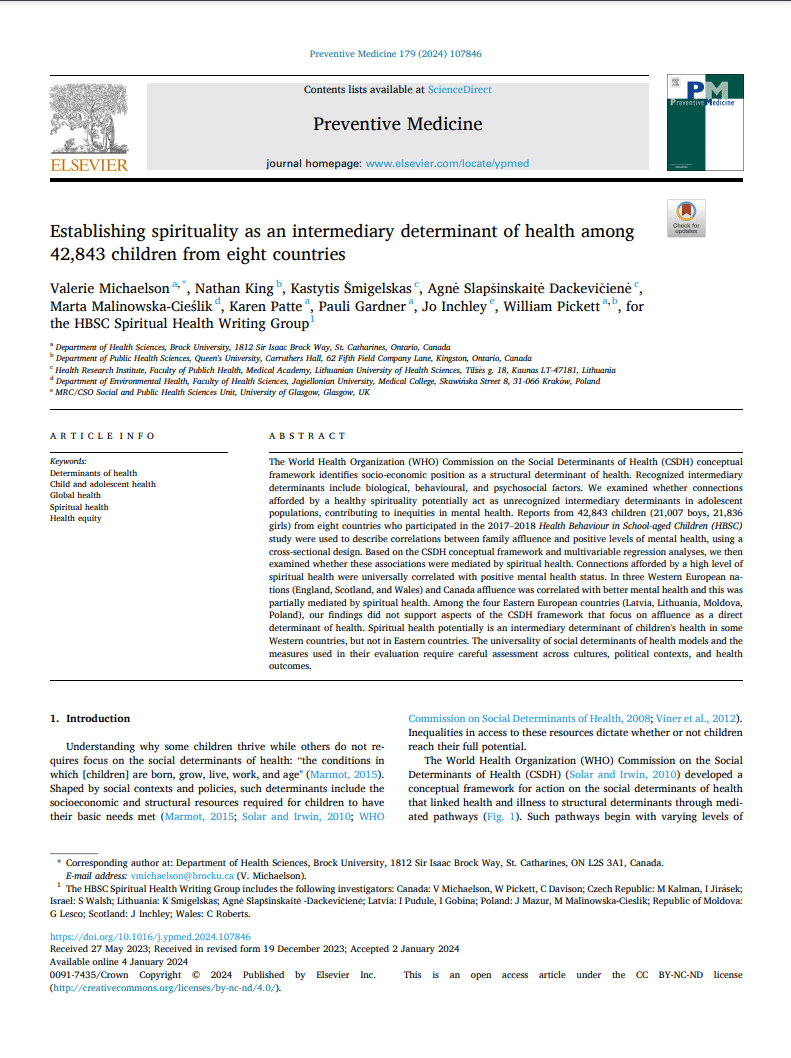Recent research from the HBSC network has brought to light a pivotal aspect of adolescent health – the role of spirituality. The new publication, titled “Establishing spirituality as an intermediary determinant of health among 42,843 children from eight countries,” led by Valerie Michaelson (HBSC Canada), examines the concept of spirituality through a unique lens, revealing its profound influence on the mental health of children aged 11 to 15.
This study explores spirituality as a potential, yet often overlooked, determinant of adolescent health. It defines spirituality not in traditional religious terms but as a broader sense of connection. These connections, as identified in the study, include relationships with others, nature, the transcendent, and critically, within oneself – particularly emphasising the sense of meaning and purpose in life. Such an approach offers a fresh perspective on how young people’s health experiences are shaped.
The research used data from eight countries participating in the 2017/18 HBSC survey cycle, including Canada, England, Scotland, Wales, Lithuania, Latvia, Moldova, and Poland, who included an optional module on child spiritual health in their HBSC surveys. The findings reveal a significant correlation between higher levels of spiritual health and improved mental health status among adolescents. This correlation is primarily influenced by the connection to self, highlighting the vital role of internal resources like personal meaning in supporting mental well-being.
Interestingly, the study also uncovers cultural variations in the relationship between spiritual health and mental health, particularly between Western and Eastern European countries. In Western nations, family affluence and better mental health outcomes are linked, with spiritual health serving as a mediating factor. However, this clear relationship does not emerge in the Eastern European countries involved in the study.
This groundbreaking research challenges existing paradigms of health inequities, emphasising the importance of considering non-material determinants such as spirituality. It calls for a recognition of the diverse cultural, historical, and political contexts that influence health disparities, advocating for a more inclusive and comprehensive approach to adolescent health research and policy development.
The study’s insights into the significant role of spiritual health as a potential intermediary determinant in adolescent health underscore the need to create environments and social structures that support the spiritual well-being of all children, irrespective of their socio-economic status. This research contributes an essential dimension to our understanding of adolescent health and well-being, suggesting a shift towards a more equitable distribution of resources that promote holistic health.
As researchers continue to navigate the complex factors influencing adolescent health, this recent analysis of HBSC study data offers critical insights into the tangible and intangible determinants shaping young people’s lives. It heralds a new direction for health policies and interventions, ensuring the holistic well-being of adolescents across diverse global contexts. This study not only represents a significant advancement in adolescent health research but also reinforces the importance of inclusive and comprehensive health policies that consider all aspects of a child’s life, paving the way for understanding and addressing young people’s mental health and well-being through a more nuanced lens.
Read the study (English)
